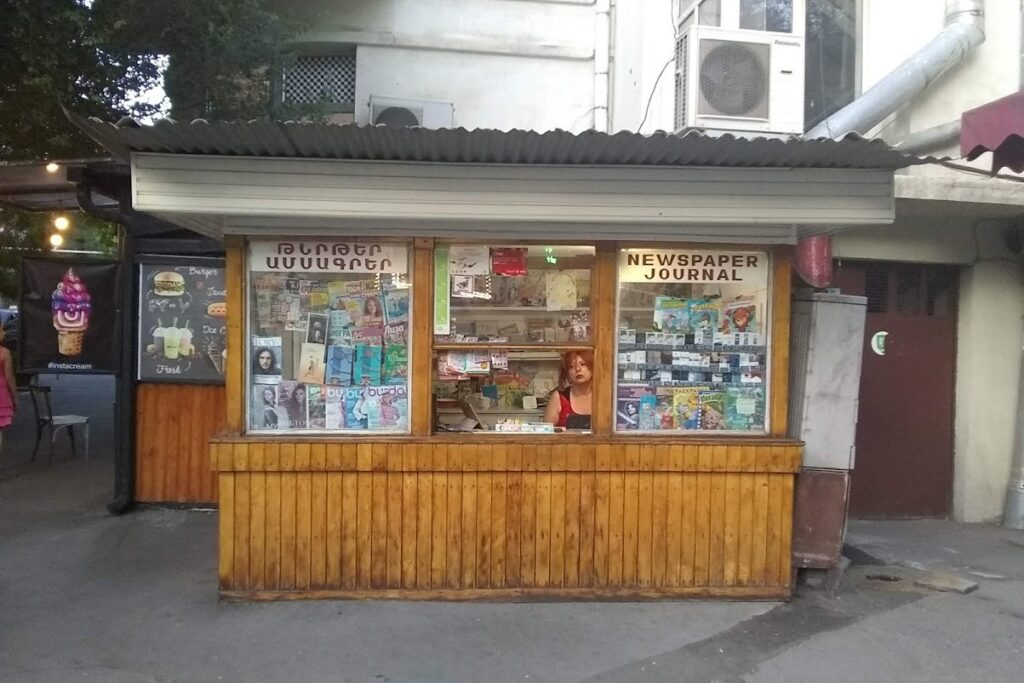In the last several months Armenia has seen the proposal of several laws which would curtail press freedoms, including fines for citing anonymous sources and punishing ‘insult or slander’ of government officials with prison.
Victoria Andreasyan, a journalist working for Infocom visited Armenia’s Syunik province on 7 February to cover the personal stories of residents living near the border with Azerbaijan. When she and her camera operator reached the entrance to the border village of Shurnukh, she discovered they could go no further.
‘We were stopped at the checkpoint’, Andreasyan told OC Media. ‘Border troops told they couldn’t allow us to enter the village as we needed permission from the National Security Service (NSS).’
There had been no public announcement of such a policy until 10 February, three days after Andreasyan’s trip to Shurnukh — when the NSS announced that journalists required permission to work in border areas for reasons of national security.
‘After some negotiations, they said we could be an exception, as we had come a long way. Although we were barred from talking to residents and shooting videos,’ Andreasyan said.
Her experience was not unique. Since the signing of the tripartite peace declaration and the end of the Second Nagorno-Karabakh War on 9 November, the work of journalists has been thrown into disarray as new and often vague restrictions, regulations, and laws are threatening to significantly limit the freedom and scope to do journalistic work in Armenia.
Legislative crackdown
In 2021, two separate bills on speech and press freedoms were presented to the Armenian parliament. The first bill entails a fivefold increase in fines for ‘insults and defamation’ — ֏5 million ($9,500) ֏10 million ($19,000), respectively — and has already passed its first hearing in the legislature. The second bill proposes to fine of up to ֏500,000 ($1,000) for media outlets that quote as sources websites or social media accounts whose ownership is not publicly known.
‘The increased fines won’t help reduce the amount of insult and slander in the media’, Gegham Vardanyan, editor-in-chief of the Media Initiatives Centre, a media literacy NGO, told OC Media, adding that it would only create a more hostile media environment.
‘A few years ago, even the Constitutional Court recommended courts avoid applying the maximum fines as it could be viewed as pressure on the media’, he said.
The anonymous sources bill is widely acknowledged to be a response to the growing popularity of often anonymous Telegram channels during and after the war, some of which had a pro-opposition bent and occasionally posted anti-government disinformation which was then echoed by established opposition media outlets.
Shushan Doydoyan, the president of the Freedom of Information Center and Associate Professor Journalism at Yerevan State University told OC Media that she believes these laws if passed, will only backfire.
‘Society has a demand for information, and it will find ways to satisfy that demand’, she said. ‘If journalists are banned from creating quality stories, the gap would be filled with gossip and fakes’.
A third additional draft bill, which has been proposed by Armenia’s General Prosecutor’s Office but not yet presented to parliament, would make illegal ‘insulting or slandering a person in public service in connection with his/her performance of official duties’. Those found guilty would face a fine of up to ֏3,000,000 ($6,300) or up to 2 years imprisonment.
A number of Armenian media watchdog organisations, including the Media Initiatives Centre, issued a joint statement denouncing the bill as ‘a logical continuation of a number of legislative initiatives introduced by the authorities in recent months’ that ‘envisage unacceptable restrictions on freedom of expression’.
‘It is impossible to ignore the fact that officials and various politicians often perceive the objective criticism of the media as an insult, as slander, and try to take revenge through the courts’, the statement reads.
A consequence of war
The sudden shift in Armenia’s media landscape began with the introduction of martial law on 27 September, the first day of the war. Under martial law, Armenian journalists were forbidden from criticizing the actions of state officials or the performance of Armenia’s military.
According to Armenian law-enforcement, 13 media outlets and 62 individuals were fined before publication restrictions were lifted on 2 December. While the restrictions were in place, roughly 600 foreign journalists received accreditation from Armenian and Nagorno-Karabakh authorities to report in Nagorno-Karabakh. Only one journalist’s accreditation was suspended — that of Ilya Azar, who published an account strongly critical of Armenian military performance in Russian independent publication, Novaya Gazeta.
After the war, Karen Harutyunyan, editor-in-chief of CivilNet, harshly criticised the restrictions placed on journalists during wartime, which resulted in reporting that, instead of informing, only ‘further dulled the public’s already foggy sense of reality’.
‘The course of the 44-day war showed that journalists’ unrestricted work would have saved the country from much greater damage and tragedy’, he wrote.
After the end of the war, the country’s Ministry of Defence appears to have maintained its strained relationship with the media — particularly through its silence. Numerous media organisations report that their freedom of information requests made to the Ministry of Defence had been denied on the grounds that the information requested was a ‘state secret’, even when it was something as basic as the number of dead, wounded, and missing Armenian soldiers.
Shushan Doydoyan said that, ultimately, she fears that the degradation of the post-war information environment and the rash censoriousness of the government threaten media freedom ‘that, with enormous effort, Armenia has gained over the years’.
For ease of reading, we choose not to use qualifiers such as ‘de facto’, ‘unrecognised’, or ‘partially recognised’ when discussing institutions or political positions within Abkhazia, Nagorno-Karabakh, and South Ossetia. This does not imply a position on their status.




 19 February 2021
19 February 2021




